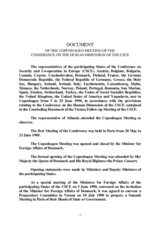Located in Warsaw, Poland, ODIHR is active throughout the 57 states of the OSCE, which span Europe, the Caucasus, Central Asia and North America. ODIHR’s mission is based on its mandate to assist OSCE states in their commitment to:
ODIHR provides support, assistance and expertise to states and civil society to promote democracy, the rule of law, human rights and tolerance. ODIHR observes elections, reviews legislation and advises governments on how to develop and sustain democratic institutions. The Office conducts training programmes for government and law-enforcement officials and non-governmental organizations on how to uphold, promote and monitor human rights. Established in 1991, ODIHR employs approximately 150 staff from over 30 countries.













